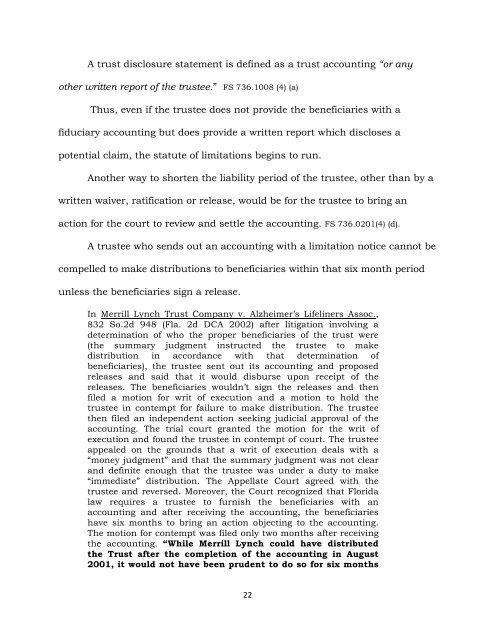Holding the Trustee Accountable - Baskin Fleece
Holding the Trustee Accountable - Baskin Fleece
Holding the Trustee Accountable - Baskin Fleece
You also want an ePaper? Increase the reach of your titles
YUMPU automatically turns print PDFs into web optimized ePapers that Google loves.
A trust disclosure statement is defined as a trust accounting “or any<br />
o<strong>the</strong>r written report of <strong>the</strong> trustee.” FS 736.1008 (4) (a)<br />
Thus, even if <strong>the</strong> trustee does not provide <strong>the</strong> beneficiaries with a<br />
fiduciary accounting but does provide a written report which discloses a<br />
potential claim, <strong>the</strong> statute of limitations begins to run.<br />
Ano<strong>the</strong>r way to shorten <strong>the</strong> liability period of <strong>the</strong> trustee, o<strong>the</strong>r than by a<br />
written waiver, ratification or release, would be for <strong>the</strong> trustee to bring an<br />
action for <strong>the</strong> court to review and settle <strong>the</strong> accounting. FS 736.0201(4) (d).<br />
A trustee who sends out an accounting with a limitation notice cannot be<br />
compelled to make distributions to beneficiaries within that six month period<br />
unless <strong>the</strong> beneficiaries sign a release.<br />
In Merrill Lynch Trust Company v. Alzheimer’s Lifeliners Assoc.,<br />
832 So.2d 948 (Fla. 2d DCA 2002) after litigation involving a<br />
determination of who <strong>the</strong> proper beneficiaries of <strong>the</strong> trust were<br />
(<strong>the</strong> summary judgment instructed <strong>the</strong> trustee to make<br />
distribution in accordance with that determination of<br />
beneficiaries), <strong>the</strong> trustee sent out its accounting and proposed<br />
releases and said that it would disburse upon receipt of <strong>the</strong><br />
releases. The beneficiaries wouldn’t sign <strong>the</strong> releases and <strong>the</strong>n<br />
filed a motion for writ of execution and a motion to hold <strong>the</strong><br />
trustee in contempt for failure to make distribution. The trustee<br />
<strong>the</strong>n filed an independent action seeking judicial approval of <strong>the</strong><br />
accounting. The trial court granted <strong>the</strong> motion for <strong>the</strong> writ of<br />
execution and found <strong>the</strong> trustee in contempt of court. The trustee<br />
appealed on <strong>the</strong> grounds that a writ of execution deals with a<br />
“money judgment” and that <strong>the</strong> summary judgment was not clear<br />
and definite enough that <strong>the</strong> trustee was under a duty to make<br />
“immediate” distribution. The Appellate Court agreed with <strong>the</strong><br />
trustee and reversed. Moreover, <strong>the</strong> Court recognized that Florida<br />
law requires a trustee to furnish <strong>the</strong> beneficiaries with an<br />
accounting and after receiving <strong>the</strong> accounting, <strong>the</strong> beneficiaries<br />
have six months to bring an action objecting to <strong>the</strong> accounting.<br />
The motion for contempt was filed only two months after receiving<br />
<strong>the</strong> accounting. “While Merrill Lynch could have distributed<br />
<strong>the</strong> Trust after <strong>the</strong> completion of <strong>the</strong> accounting in August<br />
2001, it would not have been prudent to do so for six months<br />
22


